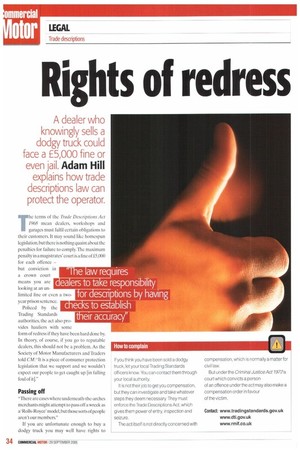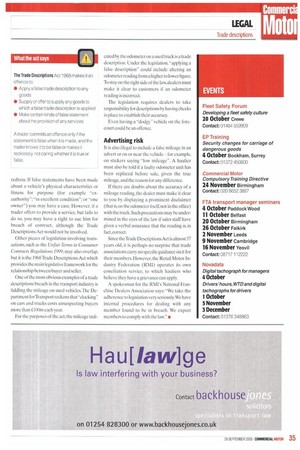Rights of redress
Page 34

Page 37

If you've noticed an error in this article please click here to report it so we can fix it.
A dealer who knowingly sells a dodgy truck could
face a £5,000 fine or
even jail. Adam Hill explains how trade descriptions law can protect the operator.
The terms of the Trade Descriptions Act 1968 mean dealers, workshops and garages must fulfil certain obligations to their customers It may sound like homespun legislation, but there is nothing quaint about the penalties for failure to comply The maximum penalty in a magistrates' court is a fine of £5,000 for each offence — but conviction in a crown court means you are e looking at an un limited line or even a twoyear prison sentence.
Policed by the Trading Standards authorities, the act also provides hauliers with some form of redress if they have been hard done by. In theory, of course, if you go to reputable dealers, this should not he a problem. As the Society of Motor Manufacturers and Traders told CM: "It is a piece of consumer protection legislation that we support and we wouldn't expect our people to get caught up lin falling foul of it]."
e aw requires c ec to establish t eir accuracy"
Passing off
"There are cases where underneath-the-arches merchants might attempt to pass off a wreck as a 'Rolls-Royce' model,but those sorts of people aren't our members."
If you are unfortunate enough to buy a dodgy truck you may well have rights to redress. If false statements have been made about a vehicle's physical characteristics or fitness for purpose (for example "exauthority"; "in excellent condition"; or "one owner") you may have a case. However, if a trader offers to provide a service, but fails to do so, you may have a right to sue him for breach of contract, although the Trade Descriptions Act would not be involved.
Other pieces of legislation involving transactions, such as the Unfair Terms in Consumer Contracts Regulations /999, may also overlap, but it is the 1968 Trade Descriptions Act which provides the main legislative framework for the relationship between buyer and seller.
One of the most obvious examples of a trade descriptions breach in the transport industry is fiddling the mileage on used vehicles. The Department forTransport reckons that "clocking" on cars and trucks costs unsuspecting buyers more than £100m each year.
For the purposes of the act, the mileage indi cated by the odometer on a used truck is a trade description. Under the legislation, "applying a false description" could include altering an odometer reading from a higher to lower figure. To stay on the right side of the lawdealers must make it clear to customers if an odometer reading is incorrect.
The legislation requires dealers to take responsibility for descriptions by having checks in place to establish their accuracy.
Even having a "dodgyvehicle on the forecourt could be an offence.
Advertising risk
It is also illegal to include a false mileage in an advert or on or near the vehicle for example, on stickers saying "low mileage-. A haulier must also be told if a faulty odometer unit has been replaced before sale, given the true mileage, and the reason for any difference.
If there are doubts about the accuracy of a mileage reading, the dealer must make it clear to you by displaying a prominent disclaimer (that is. on the odometer itself, not in the office) with the truck.Such precautions may be undermined in the eyes of the law if sales staff have given a verbal assurance that the reading is. in fact, correct.
Since the Trade Descriptions Act is almost 37 years old, it is perhaps no surprise that trade associations carry no specific guidance on it for their members, However, the Retail Motor Industry Federation (RMI) operates its own conciliation service, to which hauliers who believe they have a grievance can apply.
A spokesman for the RMI's National Franchise Dealers Association says: "We take the adherence to legislation very seriously. We have internal procedures for dealing with any member found to be in breach. We expect members to comply with the law." •






























































































































































































